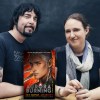Blood
Q&A: Elana K. Arnold, Author of ‘The Blood Years’
We chat with author Elana K. Arnold about her new YA novel The Blood Years, which is based on the true experiences of her grandmother’s childhood in Holocaust-era Romania and is an unforgettable tale of love and loss in the darkest days of the twentieth century—and one young woman’s will to survive them.
Hi, Elana! Welcome back! How have the past few years been since we last spoke?
So much seems to have changed over the past few years! And yet, for me, many of the core things in my life have remained the same: I’m still writing, still teaching, still taking long walks, still spending as much time as I can with my family and my pets. So, all and all, I guess things have been good!
When did you first discover your love for writing and stories?
I fell in love with books in my grandmother’s home library, chasing a patch of sun on the carpet as I sprawled, soaking up stories as much as sunlight. Nothing was off limits to me; any book I could decode was mine for the reading. Nana saw my reading as my sacred work, and we would often read the same book one after the other, then discuss it. Outside of that library, the world often felt confusing, overwhelming, unsafe. So it makes good sense that I became I writer; it seemed to me from a very early age that the only thing that might be better than reading stories would be writing my own.
Quick lightning round! Tell us the first book you ever remember reading, the one that made you want to become an author, and one that you can’t stop thinking about!
Miffy by Dick Bruna; Harriet the Spy by Louise Fitzhugh; Unmasking Autism by Devon Price, PhD
Your latest novel, The Blood Years, is out October 10th! If you could only describe it in five words, what would they be?
I need a dozen: The great and terrible things people do in the name of love.
What can readers expect?
The title, The Blood Years, refers to two things: the years before and during World War II, when antisemitism resulted in so much bloodshed and death, and also the time during which the book’s main character, Frederieke Teitler, discovers the full complexity of what it can mean to be a woman—a sister, a daughter, a granddaughter, a ballerina, a friend, an object of desire, an object of disgust. Like my other work, this story doesn’t shy away from exploring the complicated, uneasy process of coming of age… only in The Blood Years, my main character, Frederieke, must make sense of the world and her place in it as it’s falling apart all around her.
Where did the inspiration for The Blood Years come from?
Growing up, my grandmother told me stories about her childhood and teenage years in Czernowitz, Romania. Once I became a published novelist, she began telling them to me again, this time less sparingly. I asked her permission to use her story as the basis for a novel; she was pleased by the idea. “Just name the main character Frederieke,” she told me. “I’ve always liked that name.”
Were there any moments or characters you really enjoyed writing or exploring?
I love all the core family characters, but probably the character who was the most fun to write was Astra, the older sister of the protagonist, Rieke, based on my great-aunt Astrid. She’s mean as a snake, smart as a cat, deeply selfish… but also magnificent, in her own ways.
See also
Can you give us some insight into your research process for this book?
The research for this book began in my childhood, listening to Nana tell me about her life. It began again in earnest about ten years ago, after I published my first novel. I read everything I could find about the war years in and around Czernowitz, Romania; I watched survivors’ testimonials from the Holocaust Memorial Museum’s digital archives; I read PhD dissertations, memoirs, books of poetry and novels written by and about the Jewish population of Czernowitz. I joined a listserv (who even knew those still exist?) of Czernowitz survivors and their descendants. I reached out to the writer of a memoir entitled Ruth’s Journey: A Survivor’s Memoir, Ruth Glasberg Gold; she agreed to read an early draft, and we have become good friends. Basically, the research never stopped until the final draft was proofread… and I still find myself returning to my research materials, missing the incredibly difficult work I thought I couldn’t wait to finish.
What do you hope readers take away from The Blood Years?
I hope readers recognize parallels between Rieke’s past and our present; I hope they see that all stories have value, even those of people we may not consider to be “heroic”; I hope they remember Rieke and her family forever.
What’s next for you?
I’m working on another young adult novel, this one mostly set just after World War II, in France. All the research I did about this era compelled me to revisit it, but this novel, Holloway, is not straight historical fiction. It’s a portal fantasy.
Lastly, do you have any book recommendations for our readers?
I’m so lucky to be heading out on tour with the brilliant authors Brandy Colbert and Eliot Schrefer. Brandy’s The Blackwoods and Eliot’s Charming Young Man are both truly fantastic books, and I can’t wait for people to read them! Additionally, I recently read and loved Audrey Niffeneger’s The Time Traveler’s Wife and Gabrielle Zevin’s Tomorrow and Tomorrow and Tomorrow. And if people want to know more about the history of Czernowitz, Romania and its Jewish population, I can’t recommend Ruth Glasberg Gold’s Ruth’s Journey: A Survivor’s Memoir highly enough. One of the few Czernowitz Jewish survivors still alive today, Ruth is a treasure, and so is her memoir.

